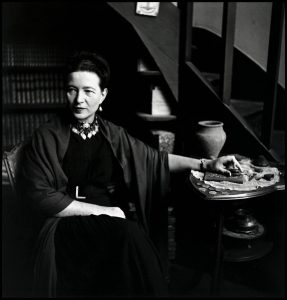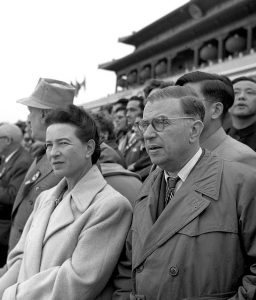Simone de Beauvoir (1908-1986)
“One is not born, but rather becomes, a woman”
Simone de Beauvoir (1908-1986) was a French feminist theorist, existentialist thinker, and famed author best know for her 1949 book titled Le Deuxième Sexe (The Second Sex) and many other publications. She wrote several novels, essays, biographies, autobiography and monographs on philosophy, politics and social issues.
Born in January 1908 in Montparnasse, an area of Paris, Simone de Beauvoir had an overall happy, privileged childhood. Growing up in a Catholic French upper-middle class family, de Beauvoir had access to an exceptional education, which she took very seriously. Her parents were Georges Bertrand de Beauvoir, a legal secretary and Françoise de Beauvoir (née Brasseur), a wealthy banker’s daughter. De Beauvoir’s sister, Hélène, was born two years after her. The family struggled to maintain their bourgeois status after losing much of their fortune shortly after World War I, and her mother insisted that the two daughters be sent to a prestigious convent school to get a good education, which would allow them an economically independent life.
Simone de Beauvoir began reading and writing at an early age, and most of what defined her later work and theory she learned from her parents. Her mother was a devout Catholic who lived up to the expected standards of how a wife should act- subordinate to her husband. De Beauvoir witnessed her mother’s experience of married life as an unequal union, and this convinced her of the unnaturalness of marriage. Although she grew up very Catholic, Simone de Beauvoir renounced her faith later in her life, choosing instead an existentialist world view. From her father she learned the importance of fervent individualism and perpetual questioning. This influenced her work as theoretician and philosopher, always questioning the world around her.
In 1929, Simone de Beauvoir earned a degree in philosophy from the University of Paris (Sorbonne) where she was one of nine women to do so. That same year she became the youngest person ever, at age twenty-one, to earn a state teaching license in the area of philosophy with highest honors. After graduation she continued taking classes at the École Normale Supérieure, where she met Jean-Paul Sartre (1905-1980) who was also a student at the time. Sartre and de Beauvoir became lifelong partners living in a joint household but never marrying or having children. They had an open relationship, which was very scandalous for their time. Although it may have shocked many, Simone de Beauvoir’s unique and independent lifestyle was a model that some women aspired to have but never thought possible. She was bisexual and was highly criticized for her relationships with young women. Her partner Sartre became one of the most famous existentialist philosophers of the twentieth century, and their ideas often influenced each other’s work.
Simone de Beauvoir’s worked as a teacher from 1929 to 1943 until her writing career took off. She identified early on as a communist and socialist, believing that women could be emancipated through socialist revolution. However, in 1972 she officially parted from this ideology and declared herself a feminist. Throughout the 1970s and the rest of her life, she was very active in the women’s liberation movement in France. She was also very involved in the anti-colonialist movement as a writer and advocate. She became one of the most outspoken female critics of the French warfare in Indochina (1946-1954) and Algeria (1954-1962) against the anti-colonial liberation movements in these French colonies. At the age of 78, de Beauvoir died of pneumonia in Montparnasse.
Throughout her lifetime, Simone de Beauvoir witnessed the world around her turn upside-down two times over as World War I and World War II destroyed the France she was born in. As a female French citizen denied the right to vote until 1944, she experienced first-hand the systematic oppression of women. De Beauvoir’s life, well documented through her many books, writings and published letters, serves as an incredible historical record of how women lived and experienced the world in the twentieth century and before. She paved the way for meaningful studies on the lives of women throughout history and set into motion a feminist movement dedicated to creating true equality, not solely de jure equality, between male and female citizens of France and of the world.
Emma Haseley, History and Women’s and Gender Studies Double Major, Studio Art Minor, Class of 2020
Sources
Literature and Websites
- Dini, Rachele. An Analysis of Simone de Beauvoir’s The Second Sex. London: Macat International Ltd. 2017.
- Tidd, Ursula. Simone de Beauvoir. London: Reaktion Books, 2009.
- Simons, Margaret A. Beauvoir and The Second Sex: Feminism, Race, and the Origins of Existentialism. Lanham, Md.: Rowman & Littlefield Publishers, 1999.
- Weitz, Margaret. “Simon de Beauvoir’s Legacy. Contemporary French Civilization 11, no. 2 (1987): 240-243.
Images



